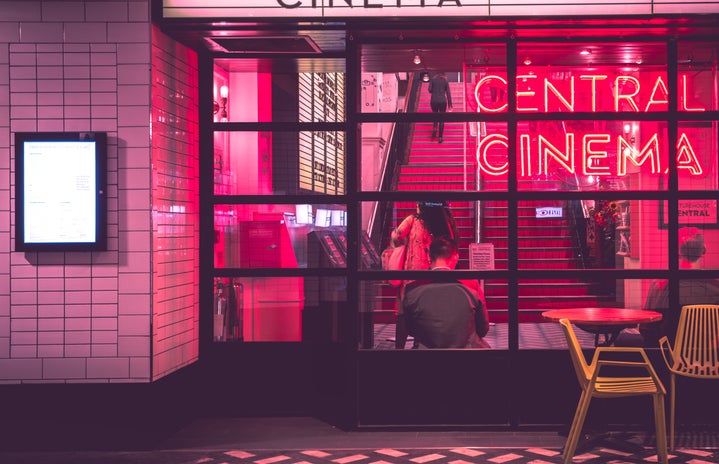The importance of watching documentaries not just about women, but through women’s perspectives should be highlighted when talking about the promotion of women’s equality. By increasing female representation, bringing up feminist topics and discussing issues related to women’s rights, girls and women all around the world may see themselves as beings capable of promoting change and being who they truly are. Furthermore, by having female filmmakers and journalists, the image of women on media becomes less based on stereotypes socially constructed and more about how women view themselves. Because of that, we selected eight documentaries not only about women and women’s equality, but also produced, made, and directed by women that every woman – and everyone – should watch.
- Period. End of Sentence
-
Menstruation is a topic that, even in western societies, is considered a tabu along with the discussion of women’s access to menstrual hygiene products, such as pads and tampons. What most western women don’t realize, in our everyday routines, is that the construction of a cultural acceptance of menstruation as a natural process many women go through is fundamental to their independence, specifically on those bloody days. This Oscar-winning documentary, available in Netflix, portrays life of women in rural India around the stigma of menstruation that still strongly affects their daily lives. When going through their menstrual periods, the portrayed women use inappropriate hygiene items and are socially considered as impure, what results in their isolation from public spaces and even from their everyday activities, like going to school. By building a pad manufacturing machine and stimulating discussion on the topic, a revolution on women independence and their access to health needs empowers women to claim for their independence and their equal rights.
- Miss Representation
-
Have you ever wondered why women have historically been praised for being beautiful or gracious rather than by their strength or leadership? Have you ever been called bossy or aggressive for putting forward your opinions? This documentary, directed by Jennifer Newson, calls out the social structures behind the oppressive reality that is put towards women since they are young girls. Furthermore, it highlights the media’s responsibility in creating utopian social norms and principles that regulate and control women’s bodies by making them believe they have to look or act a certain way. Because of that, the communicating power emanated from the mainstream media from the US underrepresents women as leaders at the same time it educates generation of women on the overvaluation of beauty standarts. The movie is available in Netflix and Amazon Prime Video.
- For Sama – Waad al Kateab
-
As a future message to her daughter, the journalist and filmmaker Waad al-Kateab filmed five years of her life while living through the Syrian Civil War. In the meantime, she goes through the universal process of falling in love, marrying and starting a family. While building a testimonial to her daughter, who was born revolved by violence and danger, Waad portrays a feminine perspective on the war, which is commonly shown to the outside world through the eyes of male journalists. While fighting for her freedom of expression by reporting the horrors of the war on civilians’ lives, she faces the difficult choice of leaving her hometown of Aleppo to potentially save her daughter’s life.
- He named me Malala
-
As a little girl born in a rural Pakhistani village, she was named Malala by her father after a hero who spoke out and was killed. It is as if he could have predicted the fighter she would later turn out to be. As a young woman, she challenged one of the world’s most dangerous terrorist groups, the Taliban, for not allowing women to go to school and almost got silenced after a bullet was shot through her head. This is the Malala known worldwide for almost getting killed by the Taliban, but little was known about what happened to the girl who liked to go to school and to play with her friends. The documentary “He named me Malala” gives an inside look into the then 16 year-old girl and the behind the scenes of her life after mere seconds inside a bus changed her trajectory forever. Watch it on Youtube or Amazon Prime!
- The Judge
-
Kholoud Al-Faqih is best known as the first woman to be appointed as a judge to the Sharia in the Middle East. The documentary revolves around her fight to be recognized as a judge and, later on, to be treated equally in her post as a male judge would be. Along Al-Faqih’s trajectory, we are presented to many issues around gendered justice, the Sharia Law and the many applications of Islamic principles into the judicial system. Therefore, this documentary also highlights the impacts of women representation on positions of leadership to empower other women and, specifically on the judicial system, to provide fair judgment in spite of gender roles.
- Chega de Fiu Fiu
-
“Chega de Fiu Fiu” was a campaign against gender-based violence, organized by the ONG Think Olga, which later became a movie, that’s now available in Google Play. Directed by Amanda Kamanchek and Fernanda Frezão, this documentary reports how violence against women portrays itself in public spaces. Filmed with hidden cameras by three women from three different Brazillian capital cities – São Paulo, Salvador and Brasília – we watch the harassment and violence most women go through their daily lives. By discussing this ingrained type of violence with specialists, this documentary puts forward the message that we, as women, should not restrain ourselves from speaking up and occupying spaces that are historically occupied by men.
- Mexeu com uma, mexeu com todas
-
Directed by the Brazilian filmmaker Sandra Werneck, this powerful documentary presents testimonies from survivors of sexual abuse while putting foward the issue on violence against women in Brazil. In this discussion, Werneck calls attention to the oppressive intimidation of women and to the social blaming of abuse victims. By presenting those narratives, the director reinforces the major role of creating unity among women to build safe network mechanisms to support women who have been victims of abuse. Meanwhile, there is also an urgent need for society to redefine masculinity standards, in other words, to rethink what is to be a man other than by violence, power and domination. Search for it on Amazon Prime Video!
- Mulheres Negras: Projetos de Mundo
-
This documentary, available in Youtube, resonates from the powerful nine voices of black women that tell their stories and their experiences as black women living in Brazil. While talking about the present, they recall the forced migration and enslaving of their ancestors to try to express how it is to be black in a deeply racist society. Therefore, this collection of testimonies highlights the divergent experiences women from different social groups, skin colors and ethnicities face in their daily lives, alerting us to the intersections that are part of defining how it is to be a woman.
—————————————————————–
The article above was edited by Beatriz Cristina.
Liked this type of content? Check Her Campus Casper Libero home page for more!


